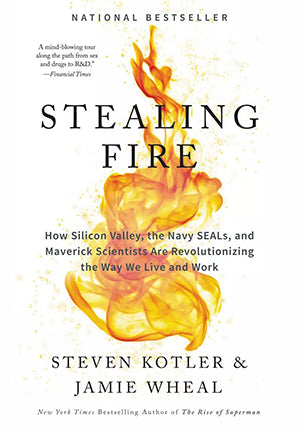

Quotes
The self “is not an unmitigated blessing,” writes Duke University psychologist Mark Leary in his aptly titled book, The Curse of the Self. “It is single-handedly responsible for many, if not most of the problems that human beings face as individuals and as a species . . . [and] conjures up a great deal of personal suffering in the form of depression, anxiety, anger, jealousy, and other negative emotions.” When you think about the billion-dollar industries that underpin the Altered States Economy, isn’t this what they’re built for? To shut off the self. To give us a few moments of relief from the voice in our heads.
When free from the confines of our normal identity, we are able to look at life, and the often repetitive stories we tell about it, with fresh eyes. Come Monday morning, we may still clamber back into the monkey suits of our everyday roles—parent, spouse, employee, boss, neighbor—but, by then, we know they're just costumes with zippers.
So, when we do experience a non-ordinary state that gives us access to something more, we feel it first as something less—and that something missing is us. Or, more specifically, the inner critic we all come with: our inner Woody Allen, that nagging, defeatist, always-on voice in our heads. You’re too fat. Too skinny. Too smart to be working this job. Too scared to do anything about it. A relentless drumbeat that rings in our ears. This was Silva’s monologue too, but he stumbled onto a curious fact—altered states can silence the nag. They act as an off switch. In these states, we’re no longer trapped by our neurotic selves because the prefrontal cortex, the very part of the brain generating that self, is no longer open for business.
What is our primary drive? Stealing Fire makes the argument that it might just be reaching what the authors refer to as ecstasis - an extraordinary state of consciousness. Whether that is through sex, psychedelics, sound, flow, or meditation these escapes from ordinary state are pursued even when they put the survival of the organism at risk.
The book is incredibly well written, draws stories from antiquity to the present, and provides the absolute best overview of state shifting practices of any book I have ever encountered. While not central characters in the narrative, it is clear that Kotler and Wheal are not just academics scouring the literature, they have placed themselves at the front lines of many of these practices and offer some very sage advice on how to engage in them for maximum benefit and minimum risk.
Quotes
The self “is not an unmitigated blessing,” writes Duke University psychologist Mark Leary in his aptly titled book, The Curse of the Self. “It is single-handedly responsible for many, if not most of the problems that human beings face as individuals and as a species . . . [and] conjures up a great deal of personal suffering in the form of depression, anxiety, anger, jealousy, and other negative emotions.” When you think about the billion-dollar industries that underpin the Altered States Economy, isn’t this what they’re built for? To shut off the self. To give us a few moments of relief from the voice in our heads.
When free from the confines of our normal identity, we are able to look at life, and the often repetitive stories we tell about it, with fresh eyes. Come Monday morning, we may still clamber back into the monkey suits of our everyday roles—parent, spouse, employee, boss, neighbor—but, by then, we know they're just costumes with zippers.
So, when we do experience a non-ordinary state that gives us access to something more, we feel it first as something less—and that something missing is us. Or, more specifically, the inner critic we all come with: our inner Woody Allen, that nagging, defeatist, always-on voice in our heads. You’re too fat. Too skinny. Too smart to be working this job. Too scared to do anything about it. A relentless drumbeat that rings in our ears. This was Silva’s monologue too, but he stumbled onto a curious fact—altered states can silence the nag. They act as an off switch. In these states, we’re no longer trapped by our neurotic selves because the prefrontal cortex, the very part of the brain generating that self, is no longer open for business.
